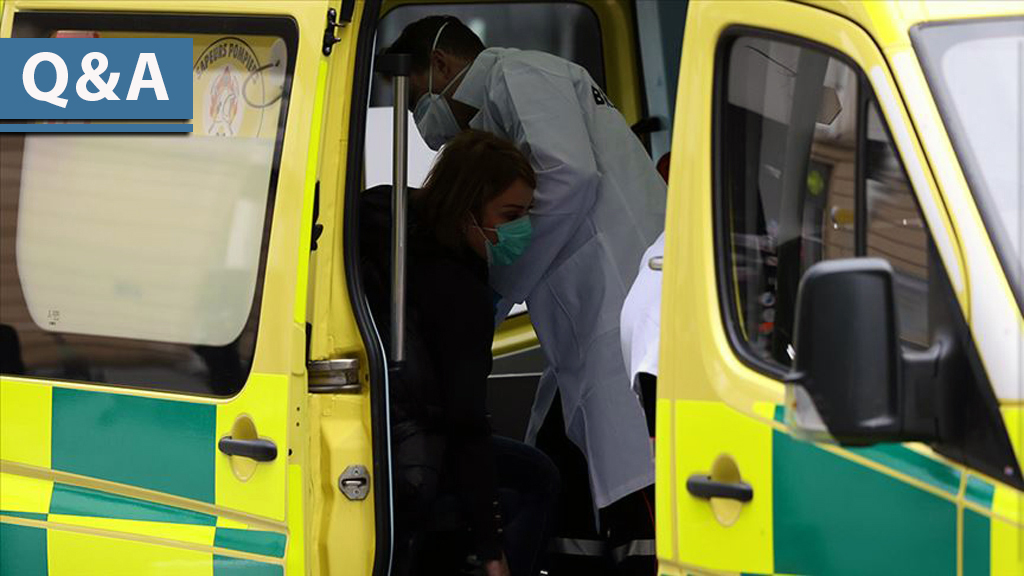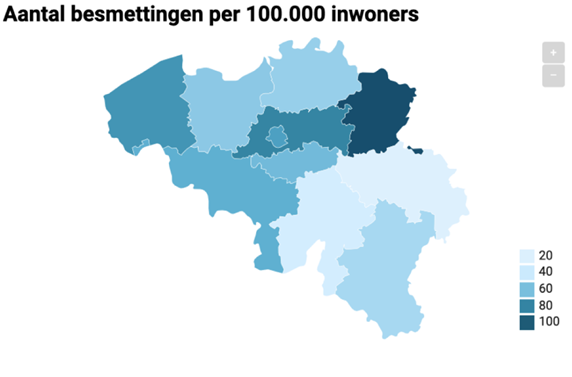- What is the overall COVID-19 breakdown in Belgium?
The first case of coronavirus disease 2019 (COVID-19) in Belgium was diagnosed on February 4, 2020. COVID-19 cases have gained momentum with the return of holidaymakers to the country. The number of cases drastically increased on March 30, amounting to a total of 11,899 confirmed cases. In Belgium, there are 927 coronavirus patients currently in intensive care units.
The first death due to COVID-19 occurred on March 11 and the death toll increased to 513 by March 30, 2020. According to the data of the National Public Health Institute of Belgium (Sciensano), 7,064 (59%) of a total of 11,899 cases were seen in Flanders; 3,351 were (28%) in Wallonia; and 1,263 (11%) in Brussels. No address information has been provided for the 221 confirmed cases (2%). According to data again by the same institute, approximately 90% of the COVID-19 deaths were patients who were over 65 years old and the youngest patient who died of coronavirus was 30 years old.
Table1. Number of COVID-19 Cases in Belgium
Source: “Belgium”, Worldometer,https://www.worldometers.info/coronavirus/country/belgium, (Access date: March 30, 2020).
The distribution of coronavirus cases across the country indicates that the province of Limburg was a hotspot for the virus. The incidences there grew much faster and caused the highest number of deaths compared to the rest of the country.
Map 1. The Ratio of Coronavirus Cases per 100,000 People in Belgium
Source: Pieter Gordts,“InKaart:HoeHard isuwProvincie Getroffen Door Het Coronavirus?”, De Morgen, March 30, 2020, https://www.demorgen.be/nieuws/in-kaart-hoe-hard-is-uw-provincie-getroffen-door-het-coronavirus~be100675, (Access date: March 30, 2020).
In this province, the number of cases jumped to 1,487 as of March 30, 2020. Such a high number of coronavirus cases drew the attention of politicians and the media. Several racist politicians trying to justify the number, declared the Turkish community living in the province as the culprit.
- How has the Turkish community become a scapegoat in the COVID-19 pandemic?
In recent weeks, an audio recording in WhatsApp groups began to spread rapidly. In the recording, an unidentified woman invited the Turkish community to follow the instructions. In the recording, the anonymous woman claimed that a doctor working in a hospital in Limburg had reached her and allegedly said that more than half of the patients diagnosed with the virus in the intensive care units were of Turkish origin.
Again, in the same period, a message allegedly belonging to a resident doctor from the same hospital started to circulate on Facebook. The message claimed that a total of 16 patients, three of whom were in intensive care, are of Turkish origin. According to this message, the reason behind the spread of the pandemic in Belgium was the fact that Belgian citizens of Turkish descent were not following the rule of “social distancing.”
Subsequently, on March 21, on her personal Facebook account, Minister of Environment, Tourism and Justice in the Flemish government Zuhal Demir, of Turkish origin and a member of the right-wing extremist N-VA Party, called on the Turkish community to follow the instructions. She voiced the cliché claims and prejudices used by the right-wing extremists for a long time to accuse the Turkish community.
Demir claimed in her statement that the coronavirus pandemic has exposed the fact that certain social segments live in a state of being unaware of the greater society to which they belong. She added that the Turkish community in Belgium lives as a closed group and that there was no change of mentality even after the precautionary measures implemented by the government. Also, according to Demir, the Turkish community was not following Flemish media outlets adequately, and as a result the Turks were uninformed about the measures that had been taken.
After this message, Minister for Home Affairs and Civic Integration of the government of Flanders Bart Somers (Open VLD/Flemish Liberal) tweeted, in Turkish, on his personal account: “Odanda kal!” (Stay in your room!). In addition, Somers stated that upon the allegations that more than half of the patients in the hospital in Limburg were of Turkish origin, they had shared multilingual brochures on the websites of the Agency for Integration and Civic Integration.
Additionally, Somers announced, again on Twitter, that they were cooperating with “influencers” from various groups in the community to ensure that the measures taken and the information about the pandemic reached all social segments.
Although this was a good initiative, the fact that such statements followed the tweets with the false allegations does not undo the negative effects on the attitude towards the Turkish community. Furthermore, all these posts were carried into newspaper pages without any fact-checking. Even a virus that does not distinguish colors, races, and religions was used for racist politics. The Turkish community in this way has become the focal point of a public debate over the coronavirus.
- What were the reactions against making the Turkish community a scapegoat?
After the Turkish community suddenly started being treated as if it were guilty of spreading the virus, information began to pour in that the news being disseminated was all fake and reactions against treating the Turkish community as a scapegoat began to surface. When the claims and subsequent reactions were out of control, the aforementioned hospital in Limburg issued an official statement confirming that there were patients of Turkish origin among those under treatment for COVID-19. It was also stated that this was nothing abnormal and nothing of great concern considering that Turkish-descent Belgian citizens were in the service area of the hospital. Additionally, the aforementioned resident doctor denied the above message in which the number of patients was allegedly given, and he claimed that the figures were not accurate.
Limburg State Governor Michel Carlier announced that the information about the percentage of Turkish-descent patients being quite high did not reflect actual facts. Following the increasing pressure on the Turkish community, the Turkish Embassy in Brussels issued a press release stating that spreading such unconfirmed news causes disinformation. The statement went on to declare, “News stigmatizing Turks is clearly not for the benefit of the culture of coexistence and social cohesion in Belgium.”
Individuals of Moroccan origin also reacted against making the Turks scapegoats in the coronavirus pandemic. The Moroccan-origin author Aya Sabi posted on her social media account that even if more than half of the coronavirus patients were of Turkish origin, this could not be related to integration in any way. She added that if one really tries to find a reason, the situation may be related to the fact that the Turks were in the risk group due to the poor condition of their lungs as they worked in coal mines for years, or it may be linked to the government’s undisciplined approach to taking measures. In this sense, she claimed, it may be related to the continuation of weddings and other gatherings until the quarantine was declared.
Sabi reminded readers that the Belgians had poured into the region of Lombardy, Italy for skiing during the winter break, and into the Netherlands in order to avoid restrictions as the Dutch government was not implementing any bans at the time. She also repeated that irresponsibility, referring to the above Belgians, cannot be related to any race or religion. For instance, the civil initiative platform called #AllemaalVanBelang (#EveryoneIsImportant) drew attention to the efforts to create the misperception that Muslims do not maintain “social distancing.” The platform underlined that very old images of a mosque and of people praying in this mosque were frequently shared on social media to this end.
As can be seen, although the important position of the Turkish community in Belgium was targeted through fake news, the truth sooner or later is uncovered thanks to individuals and civic formations with common sense.
- How did right-wing populism try to take advantage of the situation?
It is a known fact that the far right has been on the rise in recent years both in Europe and Belgium. In the current conjuncture, right-wing parties follow a political road map that allows them to benefit from every single social incident. This approach has also manifested itself during the COVID-19 crisis. While the Belgian Turkish community became a target before the public opinion by virtue of unfounded claims, the right-wing parties and their supporters remained silent on the incidents that had a great impact on the spread of the pandemic.
For example, the Belgians, who knew that the measures taken by the Belgian government would come into force on March 13 and that there was no ban in the Netherlands at that time, mindlessly flocked to cafés and restaurants in the region. This caused a reaction in Dutch public opinion against Belgians. This “weekend getaway” may explain the high number of cases in the area considering that Limburg borders with the Netherlands.
Furthermore, the measures taken were snubbed by “lockdown parties” organized in various cities of Belgium on those days. The Open VLD (Flemish Liberal) Party’s Chairwoman Gwendolyn Rutten’s husband joined this frenzy by organizing a lockdown party, and a “street party” that was attended by Izegem Mayor Bert Maertens of the N-VA. The attitude of senior party representatives, who should set an example to the public on such a vital issue, revealed once again that irresponsible behavior has nothing to do with race or religion.
On the other hand, Zuhal Demir, who accused the Turkish community of not following the Belgian media and integration with the claims that more than half of the coronavirus patients in Limburg hospitals were of Turkish origin, remained silent on this matter. Meanwhile, it is quite thought-provoking that Demir did not give the expected response about lockdown parties organized by people who are assumed to have no integration problems.
Demir leading had previously served as Secretary of State for Poverty Reduction, Equal Opportunities, People with Disabilities, Urban Policy and Scientific Policy. During her tenure, she was the staunchest opponent of teaching Turkish courses to children of Turkish origin. Demir asserted that Turkey-backed Turkish courses were for preventing the children of Turkish descent from integrating into the Flemish community, and thus, turned the Turkish community in Belgium into a target.
In addition, Demir exhibited her attitude again while defending a popular headscarf ban in schools when she alleged that girls were forced by their families to wear headscarves. She called for the next government (to be established after the current Flemish government) to include this issue in their government program. As it can be seen through these examples, one should not be surprised by Demir’s discriminatory and racist attitude. Her attitude, however, can negatively affects society’s perspective on the people of Turkish origin during this pandemic.
- What has been the attitude of the Turkish community in Belgium during the COVID-19 crisis?
According to data shared by the Consulate General of the Republic of Turkey in Brussels, the number of Belgian Turks today has exceeded 200,000. The Belgian Turkish community has now become an integral part of the country where they live.
Obviously, it is unreasonable in these difficult times to defame a community which constitutes a considerable part of the country, and to claim that the Turkish community does not comply with the measures taken against the pandemic, which is a serious threat to public health. The Belgian Turkish community believes that the pandemic can be overcome with social solidarity, and the spirit of unity and togetherness. The Turkish community in Belgium exhibits a responsible attitude by meticulously following the decisions taken by the Belgian authorities.
Moreover, the Belgian Turkish community is dedicated to shouldering responsibility in such a difficult period. To this end, both civil initiatives and leading non-governmental organizations share public announcements about the pandemic and the decisions that have been taken so far by the authorities. In the days when the pandemic gained momentum, the Belgium Religious Foundation also issued a press release stating that the decisions announced by the authorities should be followed.
In addition to these, it is known that upon learning that there is a shortage of face masks in hospitals and that Belgium was caught unprepared, women of Turkish origin with sewing machines in their homes have started to voluntarily sew masks for healthcare workers who are on the frontline of fighting the COVID-19 pandemic. In addition, Turkish business owners have bought masks that they found in the market and donated them to hospitals.
University and community college students of Turkish origin have voluntarily organized online courses so as students will not lag behind in education after schools have been suspended due to the pandemic in the country. Students of Turkish origin at health departments of universities/community colleges have volunteered to work in hospitals in order to alleviate the workload.
All these examples prove that Belgian citizens of Turkish origin, similarly to other members of the local society, are doing their best to help society overcome these difficult days with the smallest possible loss of human life.





